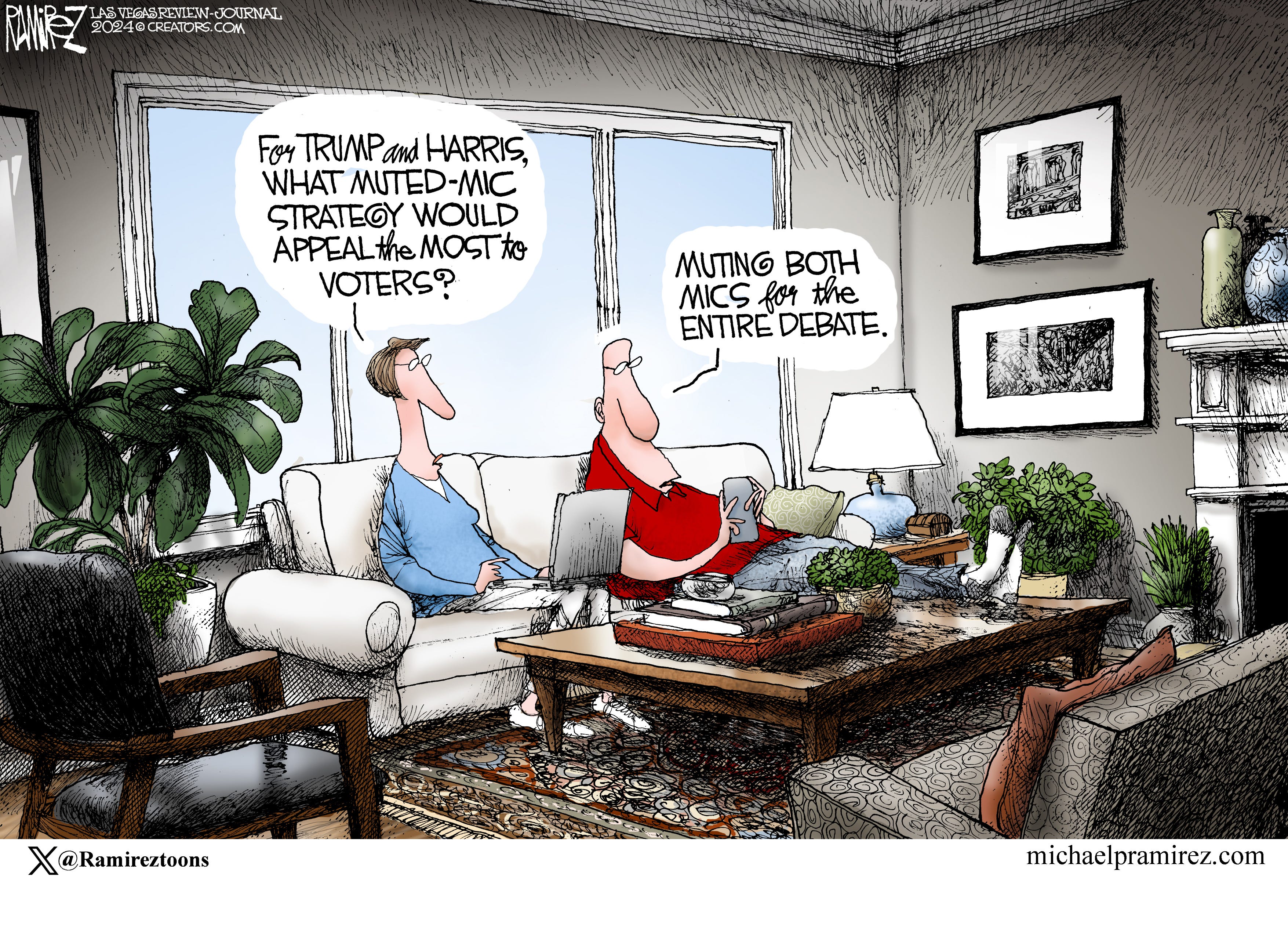News:
- I voted in our state's non-Presidential primary yesterday, and everyone I voted for won! That may be a first. Perhaps also a last.
- Didn't watch the debate, (see headline and our Eye Candy du Jour). But everyone seems to agree that Trump lost.
- The questions on Jeopardy! seem harder this year.
- I'm pretty sure I had never seen the episode of The Big Bang Theory I watched last night: ("The Skywalker Incursion", pretty funny.)
- I know it's September 11, but I have nothing new to say about that.
-
I've been pretty hard on Kamala lately. But, as Kevin D. Williamson notes, the alternative is A Would-Be Tyrant and His Willing Accomplices.
There are two aspects of Donald Trump’s character that are important to understand in September 2024: First, that he is a lunatic; second, that he is a coward.
Trump’s personal cowardice is, of course, legendary. His campaign has worked very hard to find something disqualifying in Minnesota Gov. Tim Waltz’s 24-year military career, and it has been nauseating to watch Marine veteran J. D. Vance play the attack dog (think yappy little dachshund) on that front, acting on behalf of a man whose father bought him a phony diagnosis of bone spurs (which miraculously healed without treatment!) to keep him out of military service when his country came calling during the Vietnam era.
Trump is manifestly afraid of all sorts of things: germs (handshakes are “barbaric,” he once whined), birds, women who are not on his payroll, etc. But he also is afraid to do his own lunatic dirty work.
Trump has recently intensified his habit of reposting Truth Social content of a barking-mad nature—calling for military tribunals to hear cases against Liz Cheney and Barack Obama, sedition charges against members of the January 6 committee, things of that nature. He reposts QAnon content, vague (and not-so-vague) threats to use violence against his political opponents. That these are reposts on his little-used narcissistic social-media platform rather than things he says himself in public is a way of avoiding direct accountability for this lunacy. Low-bottom sycophants and cowards such as Sen. Ted Cruz and Speaker of the House Mike Johnson find it easier to blow off questions about Trump’s reposts on an obscure digital outlet than questions about the lunatic things that come out of the man’s own mouth or phone.
But those things are bonkers, too.
There's more, much more. As always, I encourage you to subscribe.
For the record,
greptells me I've referred to Trump as "Bone Spurs" 62 times since 2018. (And Biden as "Wheezy" 167 times.) Juvenile, but …
-
Not that we're letting Kamala go unscathed. Jack Salmon at Reason says she's large, she contains multitudes: Kamala Harris Pledges To Soak the Wealthy—But Her Policies Have Enriched Them.
As the presidential race enters its final weeks, Vice President Kamala Harris is positioning herself as the champion of middle-class America, vowing to finally make the wealthy pay their fair share. Yet a closer look at her record over the past four years reveals a stark contrast between her rhetoric and reality. Far from soaking the rich, Harris' policies have funneled resources to the wealthy and corporations while burdening middle-class taxpayers.
Corporate subsidies have exploded under the Biden-Harris administration. In 2021, the 10-year budget allocation for corporate subsidies was $1.2 trillion. Three years later, it has now surpassed $2 trillion.
The 2022 CHIPS and Science Act included $54 billion in corporate subsidies—Intel alone received almost $20 billion in grants and loans through the CHIPS Act. The Inflation Reduction Act (IRA) uncapped a slew of energy subsidies, massively expanding energy production and investment tax credits, and according to the Brookings Institution, will cost an estimated $780 billion, just in corporate welfare, by 2031.
The beneficiaries of this largesse are extremely concentrated. Three-quarters of the benefits of the IRA are shared by just 15 large corporations, seven of which are foreign. Wind turbine manufacturers like General Electric, Vestas, and Siemens/Gamesa—who collectively produce 79 percent of all turbines—are among the biggest winners. These companies also have a presence on the board of the wind energy lobby, the American Clean Power Association.
Kamala recently visited our fair state to extol small business and describe all the taxpayer largesse that she would drop upon them.
And then later excoriate the more successful ones as price-gougers, shrinkflationists, greedheads,…
-
Turnabout may be fair play, but it's often not a good idea. Jacob Mchangama has Reflections on Right-Wing Cancel Culture.
“The Left started it.”
That was the common retort from right-wing X accounts like Libs of TikTok and their supporters, who attempted and often succeeded at getting people fired for making tasteless social media posts about the assassination attempt on Donald Trump back in July.
Most of their victims weren’t public figures but regular Americans like Home Depot employees, firefighters, chefs, and school counselors. This was fine and good, many argued, because it constituted sweet revenge for cancel culture excesses driven by the Left. At The American Spectator, Nate Hochman claimed that the only way to get the Left to change is to make them “understand, at a visceral level, the penalties for the system that they themselves constructed—so much so, in fact, that they are no longer interested in perpetuating it.”
But the idea that the Left invented cancel culture is a poor and convenient excuse for satisfying the intolerant impulses that have tempted all humans throughout history regardless of political orientation. Using similarly flawed logic, Catholic persecution of paganism was justified since emperor Nero “started it.” Protestants would be entitled to persecute Catholics, as Protestant states frequently did, because the Church excommunicated Luther, banned his books, and punished heretics. We would also have to reevaluate the censorship and persecution in socialist and communist states. After all, Marx, Lenin, and Stalin were all subject to harsh censorship from various political and religious factions of the “bourgeoisie” before the establishment of the Dictatorship of the Proletariat turned the censored into censors.
Just don't try to wreck peoples' lives just because they have some oddball, even odious, opinions.
-
Not me, but I get it. Kat Rosenfield observes We Are All ‘Walz’s for Trump’.
As we bate our collective breath for an October surprise, the American electorate is celebrating an even more beloved political tradition. Ladies and gents, this is Backstabbing September, that magical month when the most disgruntled members of a candidate’s extended family take to the airwaves, the papers, social media platforms—to let the public know that their politically ambitious relative is a monster and utterly unfit for office.
Last week’s headline betrayal came courtesy of a group of Tim Walz’s Midwestern relatives, who posed for a photo announcing their support for Donald Trump, complete with a giant “TAKE AMERICA BACK” banner and matching MAGA aesthetic t-shirts that read NEBRASKA WALZ’S FOR TRUMP. In addition to triggering a meltdown among copy editors everywhere (Pro tip: The plural of “Walz” is “Walzes”), the photograph was met with outrage from Tim’s more loyal relatives: His sister said she didn’t recognize the people in it, and his mother identified them as distant cousins.
But unfortunately for Tim, this was not the first dissenting Walz to throw a wrench in the works of his vice-presidential aspirations. The week before the faithless Nebraskans made their social media debut, Tim’s brother, Jeff, wrote a Facebook post publicly declaring his opposition to Tim’s ideology.
Nobody has been enjoying this spectacle more than Donald Trump, who thanked Jeff on Truth Social, writing: “I look forward to meeting you soon!” But Trump is far from safe when it comes to backstabbing relatives. He’s got Mary Trump, the grudge-holding niece whose loathing for her Uncle Donald is so intense that she’s published three books about it in four years. (Her new memoir, Who Could Ever Love You, is out today.) And then there’s her brother, Fred Trump III, who hopped aboard the Trumps Against Trump train this summer with his own less-than-complimentary memoir about the family. Subtitle: “The Trumps and How We Got This Way.”
Fortunately, all my relatives make an honest living.
| Recently on the book blog: |



![[The Blogger and His Dog]](/ps/images/me_with_barney.jpg)



